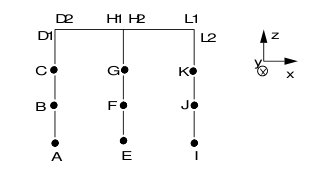3. Modeling A#
3.1. Characteristics of modeling#
Modeling POU_D_E

Discretization:
elements \(\mathrm{AB}\), \(\mathrm{EF}\), \(\mathrm{IJ}\): 10 meshes: SEG2
elements \(\mathrm{BC}\), \(\mathrm{FG}\), \(\mathrm{JK}\): 10 meshes: SEG2
elements \(\mathrm{CD1}\), \(\mathrm{GH1}\), \(\mathrm{KL1}\): 1 mesh: SEG2
elements \(\mathrm{D2H1}\), \(\mathrm{H2L1}\): 30 meshes: SEG2
Dynamic evolution on \(\mathrm{1s}\) discretized in \(5.{10}^{-4}s\) time steps with the NEWMARK \((a=0.25,d=0.5)\) algorithm.
Storing results every 20 steps of time is \({10}^{-2}s\).
3.2. Characteristics of the mesh#
Number of knots: 126
Number of meshes and types: 123 meshes SEG2
3.3. Tested sizes and results#
Identification |
Test reference |
\(t=0.12s\) |
|
\({u}_{y}\) in \(\mathrm{C2}\) |
|
\({M}_{x}\) in \(\mathrm{S1}\) |
—3140. \(\text{Nm}\) |
\({M}_{x}\) in \(\mathrm{S2}\) |
—10150. \(\text{Nm}\) |
\({M}_{x}\) in \(\mathrm{S3}\) |
—3130. \(\text{Nm}\) |
\({M}_{z}\) in \(\mathrm{C2}\) |
|
\(t=0.70s\) |
|
\({u}_{y}\) in \(\mathrm{C2}\) |
|
\({M}_{x}\) in \(\mathrm{S1}\) |
—6080. \(\text{Nm}\) |
\({M}_{x}\) in \(\mathrm{S2}\) |
—19670. \(\text{Nm}\) |
\({M}_{x}\) in \(\mathrm{S3}\) |
—6060. \(\text{Nm}\) |
\({M}_{z}\) in \(\mathrm{C2}\) |
|
Maxima obtained at \(t=0.12s\) (1st short circuit) or \(t=0.70s\) (2nd short circuit) or reclosing (tests-calculation compliance).
3.4. notes#
The results obtained by Code_aster are satisfactory compared to the other codes. They are almost always below the measurements (effects of frames \(\mathrm{AB}\), \(\mathrm{EF}\), \(\mathrm{IJ}\) overestimated). The maxima are clipped due to periodic storage.
Contents of the results file:
Move all \({10}^{-2}s\) and effort into the elements at times \(t=0.12s\), \(t=0.27s\), \(t=0.70s\).